孔子语录《论语》中英文对照
文言文孔子语录翻译
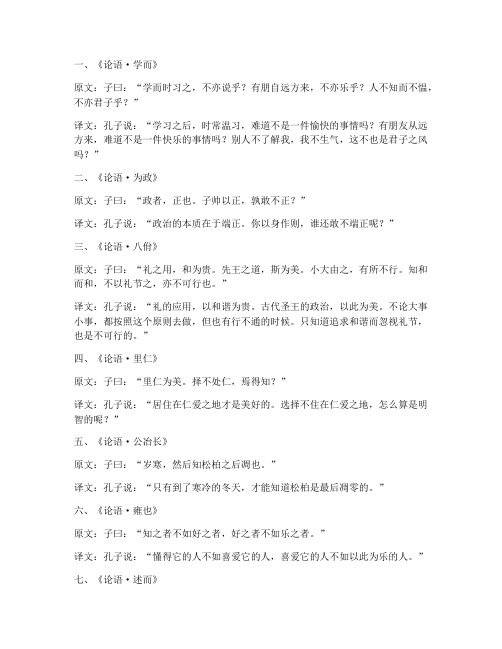
一、《论语·学而》原文:子曰:“学而时习之,不亦说乎?有朋自远方来,不亦乐乎?人不知而不愠,不亦君子乎?”译文:孔子说:“学习之后,时常温习,难道不是一件愉快的事情吗?有朋友从远方来,难道不是一件快乐的事情吗?别人不了解我,我不生气,这不也是君子之风吗?”二、《论语·为政》原文:子曰:“政者,正也。
子帅以正,孰敢不正?”译文:孔子说:“政治的本质在于端正。
你以身作则,谁还敢不端正呢?”三、《论语·八佾》原文:子曰:“礼之用,和为贵。
先王之道,斯为美。
小大由之,有所不行。
知和而和,不以礼节之,亦不可行也。
”译文:孔子说:“礼的应用,以和谐为贵。
古代圣王的政治,以此为美。
不论大事小事,都按照这个原则去做,但也有行不通的时候。
只知道追求和谐而忽视礼节,也是不可行的。
”四、《论语·里仁》原文:子曰:“里仁为美。
择不处仁,焉得知?”译文:孔子说:“居住在仁爱之地才是美好的。
选择不住在仁爱之地,怎么算是明智的呢?”五、《论语·公冶长》原文:子曰:“岁寒,然后知松柏之后凋也。
”译文:孔子说:“只有到了寒冷的冬天,才能知道松柏是最后凋零的。
”六、《论语·雍也》原文:子曰:“知之者不如好之者,好之者不如乐之者。
”译文:孔子说:“懂得它的人不如喜爱它的人,喜爱它的人不如以此为乐的人。
”七、《论语·述而》原文:子曰:“三人行,必有我师焉。
择其善者而从之,其不善者而改之。
”译文:孔子说:“三个人同行,其中必定有我可以学习的人。
我选择他们的优点来学习,看到他们的不足就加以改正。
”八、《论语·泰伯》原文:子曰:“君子坦荡荡,小人长戚戚。
”译文:孔子说:“君子心胸宽广,小人则常常忧愁。
”九、《论语·子罕》原文:子曰:“君子食无求饱,居无求安,敏于事而慎于言,可谓好学也已。
”译文:孔子说:“君子饮食不求饱足,居住不求安逸,勤于工作而谨慎言语,可以说是好学了。
孔子的论语中英文
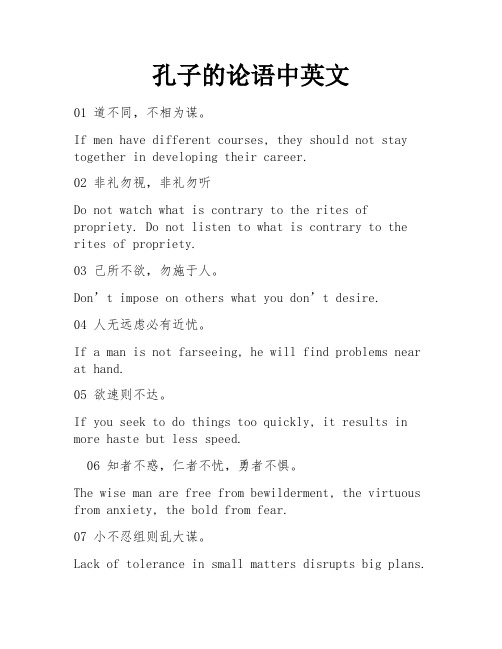
孔子的论语中英文01 道不同,不相为谋。
If men have different courses, they should not stay together in developing their career.02 非礼勿视,非礼勿听Do not watch what is contrary to the rites of propriety. Do not listen to what is contrary to the rites of propriety.03 己所不欲,勿施于人。
Don’t impose on others what you don’t desire.04 人无远虑必有近忧。
If a man is not farseeing, he will find problems near at hand.05 欲速则不达。
If you seek to do things too quickly, it results in more haste but less speed.06 知者不惑,仁者不忧,勇者不惧。
The wise man are free from bewilderment, the virtuous from anxiety, the bold from fear.07 小不忍组则乱大谋。
Lack of tolerance in small matters disrupts big plans.08 见贤思齐,见不贤而内自省也。
When we see a man of true virtue, we should think of equaling them. When we see an unethical man, we should look inwards and reflect on ourselves.09 工欲善其事必先利其器。
The mechanic, who wishes to do his work well, must sharpen his tools first.10 父母在,不远游, 游必有方。
《论语》选段翻译(中英文对照)
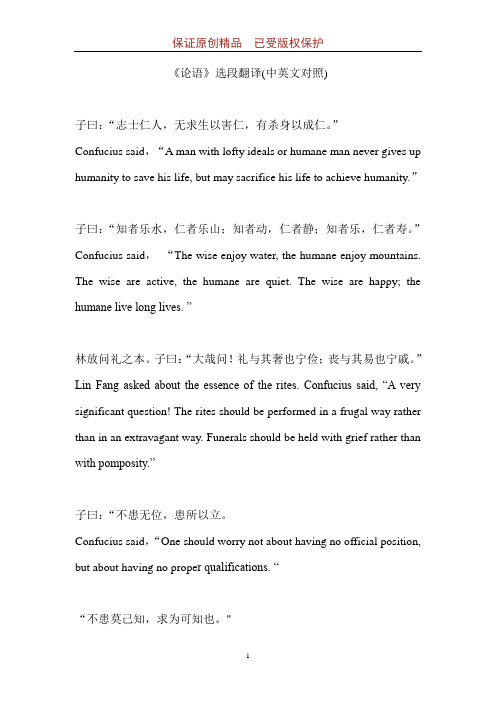
《论语》选段翻译(中英文对照)子曰:“志士仁人,无求生以害仁,有杀身以成仁。
”Confucius said,“A man with lofty ideals or humane man never gives up humanity to save his life, but may sacrifice his life to achieve humanity.”子曰:“知者乐水,仁者乐山;知者动,仁者静;知者乐,仁者寿。
”Confucius said,“The wise enjoy water, the humane enjoy mountains. The wise are active, the humane are quiet. The wise are happy; the humane live long lives. ”林放问礼之本。
子曰:“大哉问!礼与其奢也宁俭;丧与其易也宁戚。
”Lin Fang asked about the essence of the rites. Confucius said, “A very significant question! The rites should be performed in a frugal way rather than in an extravagant way. Funerals should be held with grief rather than with pomposity.”子曰:“不患无位,患所以立。
Confucius said,“One should worry not about having no official position, but about having no prope r qualifications. ““不患莫己知,求为可知也。
"”One should not seek to be known to others, but seek to acquire the qualities worthy of being known.”子曰:“人无远虑,必有近忧。
孔子文言文英语翻译

孔子曰:“学而时习之,不亦说乎?有朋自远方来,不亦乐乎?人不知而不愠,不亦君子乎?”翻译:Confucius said, "To learn and to practice what one has learned at the proper time, is not this a joy? To have friends coming from afar, is not this a delight? To be unaware of others' understanding and yet not to be angry, is not this the conduct of a gentleman?"孔子认为,学习之后要及时复习,这是令人愉悦的事情。
有朋友从远方来,这是令人高兴的事情。
别人不了解自己,自己却不生气,这是君子的行为。
原文:子曰:“三人行,必有我师焉。
择其善者而从之,其不善者而改之。
”翻译:Confucius said, "Among three people walking together, there must be someone who can be my teacher. I shall follow the good in him, and correct the bad."孔子说:“三个人同行,其中必定有我可以向他学习的人。
我要选择他的优点去学习,对于他的缺点,我要加以改正。
”原文:子曰:“温故而知新,可以为师矣。
”翻译:Confucius said, "By reviewing the past, one can gain new insights, and thus can be considered a teacher."孔子说:“通过温习过去的知识,可以获得新的认识,这样就可以成为别人的老师了。
孔子语录英汉对照

孔子语录英汉对照第一篇:孔子语录英汉对照1.子曰:“学而时习之,不亦悦乎?有朋自远方来,不亦乐乎?人不知而不愠,不亦君子乎?”The Master said, “to learn and at due times to repeat what one has learned, is that not after all a pleasure? That friends should come to one from afar, is this not after all delightful? To remain unsoured even though one's merits are unrecognized by others, is that not after all what is expected of a gentleman?”2.子曰:“吾十有五而志于学,三十而立,四十而不惑,五十而知天命,六十而耳顺,七十而从心所欲,不逾矩。
”The Master said, “At fifteen I set my heart upon learning.At thirty, I planted my feet firm upon the ground.At forty, I no longer suffered from perplexities(困惑;窘困).At fifty, I knew what were the biddings(命令,吩咐)of Heaven.At sixty, I heard them with docile(驯顺的,驯良的)ear.At seventy, I could follow the dictates(听从...支配)of my own heart;for what I desired no longer overstepped(逾越)the boundaries of right.”3.子曰:“贤哉回也!一箪食,一瓢饮,在陋巷,人不堪其忧,回也不改其乐。
孔子名言《论语》中的名言名句(英汉对照)

孔子名言《论语》中的名言名句(英汉对照)一、唯女子与小人,为难养也。
近之则不孙,远之则怨。
Of all people, girls and servants are the most difficultto behave to. If you are familiar with them, they lose their humility. If you maintain a reserve towards them, they are discontented.二、父母在,不远游,游必有方。
While his parents are alive, the son may not go abroad to a distance. If he does go abroad, he must have a fixed placeto which he goes.三、德不孤,必有邻。
Virtue is not left to stand alone. He who practices itwill have neighbors.四、吾十有五而志于学,三十而立,四十而不惑,五十而知天命,六十而耳顺,七十而从心所欲,不逾矩。
At fifteen I set my heart upon learning. At thirty, I planted my feet firm upon the ground. At forty, I no longer suffered from perplexities . At fifty, I knew what thebiddings of Heaven were. At sixty, I heard them with docile ear. At seventy, I could follow the dictates of my own heart; for what I desired no longer overstepped the boundaries of right.五、贤哉回也!一箪食,一瓢饮,在陋巷,人不堪其忧,回也不改其乐。
孔子语录(论语)中英文对照翻译

人物语录:孔子语录(论语)中英文对照翻译AnalectsThe Master said, to learn and at due times to repeat what one has learned, is that not after all a pleasure? That friends should come to one from afar, is this not after all delightful? To remain unsoured even though one’s m erits are unrecognized by others, is that not after all what is expected of a gentleman?The Master said, “At fifteen I set my heart upon learning. At thirty, I planted my feet firm upon the ground. At forty, I no longer suffered from2)perplexities. At fifty, I knew what were the 3)biddings of Heaven. At sixty,I heard them with 4)docile ear. At seventy, I could follow the 5)dictates of my own heart; for what I desired no longer overstepped the boundaries of right.”The Master said, 6)incomparable indeed was Hui! A handful of rice to eat, a 7)gourdful of water to drink, living in a mean street. Others would have found it 8)unendurably depressing, but to Hui’s cheerfulness it made no difference at all. Incomparable indeed was Hui!论语(一) 子曰:“学而时习之,不亦悦乎?有朋自远方来,不亦乐乎?人不知而不愠,不亦君子乎?”(二) 子曰:“吾十有五而志于学,三十而立,四十而不惑,五十而知天命,六十而耳顺,七十而从心所欲,不逾矩。
孔子名言《论语》中的名言名句(英汉对照)
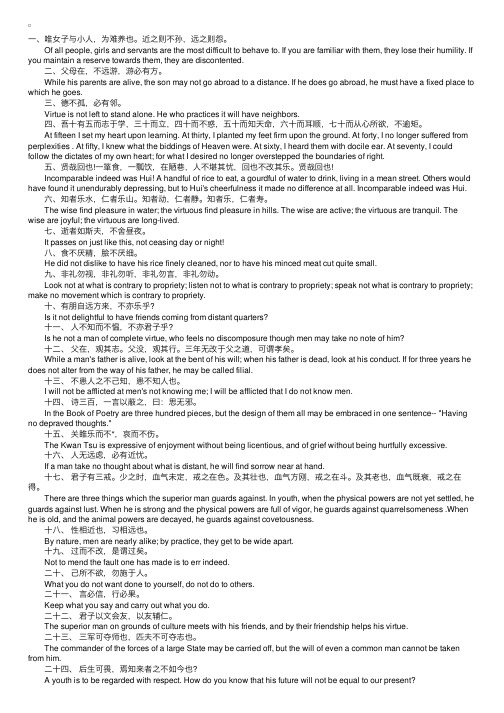
⼀、唯⼥⼦与⼩⼈,为难养也。
近之则不孙,远之则怨。
Of all people, girls and servants are the most difficult to behave to. If you are familiar with them, they lose their humility. If you maintain a reserve towards them, they are discontented. ⼆、⽗母在,不远游,游必有⽅。
While his parents are alive, the son may not go abroad to a distance. If he does go abroad, he must have a fixed place to which he goes. 三、德不孤,必有邻。
Virtue is not left to stand alone. He who practices it will have neighbors. 四、吾⼗有五⽽志于学,三⼗⽽⽴,四⼗⽽不惑,五⼗⽽知天命,六⼗⽽⽿顺,七⼗⽽从⼼所欲,不逾矩。
At fifteen I set my heart upon learning. At thirty, I planted my feet firm upon the ground. At forty, I no longer suffered from perplexities . At fifty, I knew what the biddings of Heaven were. At sixty, I heard them with docile ear. At seventy, I could follow the dictates of my own heart; for what I desired no longer overstepped the boundaries of right. 五、贤哉回也!⼀箪⾷,⼀瓢饮,在陋巷,⼈不堪其忧,回也不改其乐。
孔子语录(论语)中英文对照翻译(样例5)
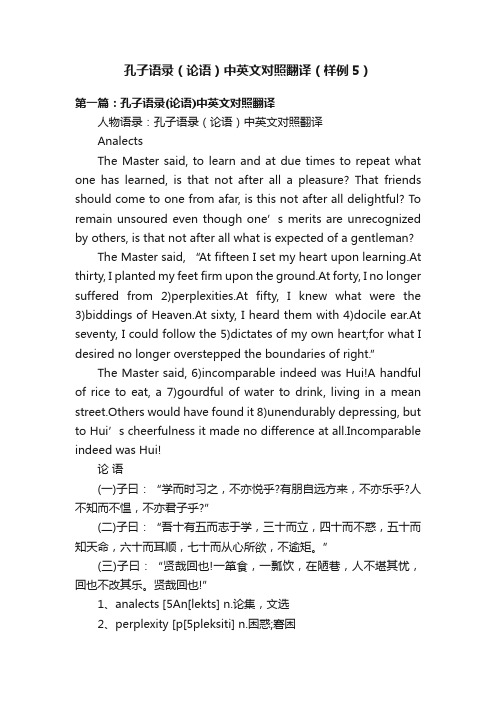
孔子语录(论语)中英文对照翻译(样例5)第一篇:孔子语录(论语)中英文对照翻译人物语录:孔子语录(论语)中英文对照翻译AnalectsThe Master said, to learn and at due times to repeat what one has learned, is that not after all a pleasure? That friends should come to one from afar, is this not after all delightful? To remain unsoured even though one’s merits are unrecognized by others, is that not after all what is expected of a gentleman?The Master said, “At fifteen I set my heart upon learning.At thirty, I planted my feet firm upon the ground.At forty, I no longer suffered from 2)perplexities.At fifty, I knew what were the 3)biddings of Heaven.At sixty, I heard them with 4)docile ear.At seventy, I could follow the 5)dictates of my own heart;for what I desired no longer overstepped the boundaries of right.”The Master said, 6)incomparable indeed was Hui!A handful of rice to eat, a 7)gourdful of water to drink, living in a mean street.Others would have found it 8)unendurably depressing, but to Hui’s cheerfulness it made no difference at all.Incomparable indeed was Hui!论语(一)子曰:“学而时习之,不亦悦乎?有朋自远方来,不亦乐乎?人不知而不愠,不亦君子乎?”(二)子曰:“吾十有五而志于学,三十而立,四十而不惑,五十而知天命,六十而耳顺,七十而从心所欲,不逾矩。
论语中英对照语录

论语中英对照语录论语中英对照语录大全篇一:论语经典语录翻译Selected Readings of the Analects述而 - Shu ErEnglish translation: James Legge1 子曰:“述而不作,信而好古,窃比于我老彭。
”The Master said, “A transmitter and not a maker, believing in and loving the ancients, I venture to compare myself with our old Peng."2子曰:“默而识之,学而不厌,诲人不倦,何有于我哉?”The Master said, “The silent treasuring up of knowledge; learning without satiety; and instructing others without being wearied - which one of these things belongs to me?”3子曰:“德之不修,学之不讲,闻义不能徙,不善不能改,是吾忧也。
”The Master said, “The learning virtue without proper cultivation; the not thoroughly discussing what is learned; not being able to move towards righteousness of which a knowledge is gained; and not being able to change what is not good - these are the things which occasion me solicitude.”4 子之燕居,申申如也,夭夭如也。
When the Master was unoccupied with business, his manner was easy, and he looked pleased.5 子曰:“甚矣吾衰也!久矣吾不复梦见周公。
《论语》选段翻译(中英文对照)

《论语》选段翻译(中英文对照)子曰:“志士仁人,无求生以害仁,有杀身以成仁。
”Confucius said,“A man with lofty ideals or humane man never gives up humanity to save his life, but may sacrifice his life to achieve humanity.”子曰:“知者乐水,仁者乐山;知者动,仁者静;知者乐,仁者寿。
”Confucius said,“The wise enjoy water, the humane enjoy mountains. The wise are active, the humane are quiet. The wise are happy; the humane live long lives. ”林放问礼之本。
子曰:“大哉问!礼与其奢也宁俭;丧与其易也宁戚。
”Lin Fang asked about the essence of the rites. Confucius said, “A very significant question! The rites should be performed in a frugal way rather than in an extravagant way. Funerals should be held with grief rather than with pomposity.”子曰:“不患无位,患所以立。
Confucius said,“One should worry not about having no official position, but about having no prope r qualifications. ““不患莫己知,求为可知也。
"”One should not seek to be known to others, but seek to acquire the qualities worthy of being known.”子曰:“人无远虑,必有近忧。
论语十则及翻译
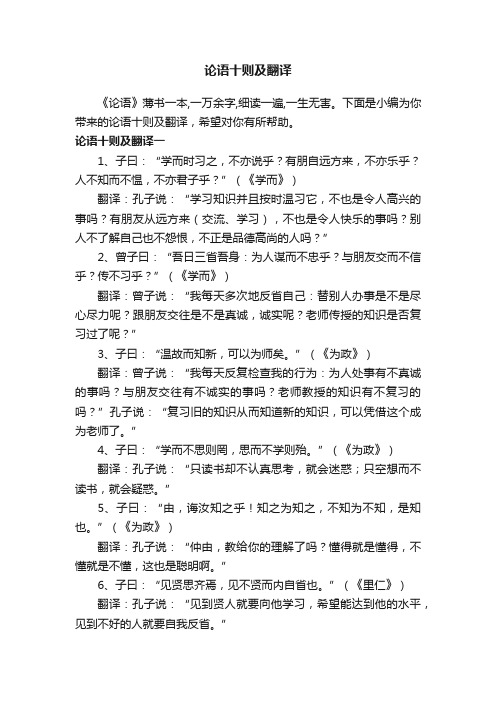
论语十则及翻译《论语》薄书一本,一万余字,细读一遍,一生无害。
下面是小编为你带来的论语十则及翻译,希望对你有所帮助。
论语十则及翻译一1、子曰:“学而时习之,不亦说乎?有朋自远方来,不亦乐乎?人不知而不愠,不亦君子乎?”(《学而》)翻译:孔子说:“学习知识并且按时温习它,不也是令人高兴的事吗?有朋友从远方来(交流、学习),不也是令人快乐的事吗?别人不了解自己也不怨恨,不正是品德高尚的人吗?”2、曾子曰:“吾日三省吾身:为人谋而不忠乎?与朋友交而不信乎?传不习乎?”(《学而》)翻译:曾子说:“我每天多次地反省自己:替别人办事是不是尽心尽力呢?跟朋友交往是不是真诚,诚实呢?老师传授的知识是否复习过了呢?”3、子曰:“温故而知新,可以为师矣。
”(《为政》)翻译:曾子说:“我每天反复检查我的行为:为人处事有不真诚的事吗?与朋友交往有不诚实的事吗?老师教授的知识有不复习的吗?”孔子说:“复习旧的知识从而知道新的知识,可以凭借这个成为老师了。
”4、子曰:“学而不思则罔,思而不学则殆。
”(《为政》)翻译:孔子说:“只读书却不认真思考,就会迷惑;只空想而不读书,就会疑惑。
”5、子曰:“由,诲汝知之乎!知之为知之,不知为不知,是知也。
”(《为政》)翻译:孔子说:“仲由,教给你的理解了吗?懂得就是懂得,不懂就是不懂,这也是聪明啊。
”6、子曰:“见贤思齐焉,见不贤而内自省也。
”(《里仁》)翻译:孔子说:“见到贤人就要向他学习,希望能达到他的水平,见到不好的人就要自我反省。
”7、子曰:“三人行,必有我师焉。
择其善者而从之,其不善者而改之。
”(《述而》)翻译:孔子说:“三个人一起走,其中必定有可以做我老师的人,学习他的优点,如果自己也有他的缺点就加以改正。
”8、曾子曰:“士不可以不弘毅,任重而道远。
仁以为己任,不亦重乎?死而后已,不亦远乎?”(《泰伯》)翻译:曾子说:“有抱负的人不可以不胸怀宽广,意志坚定,因为他肩负着重大的使命(或责任),路途又很遥远。
孔子《论语》全文及译文精选全文

可编辑修改精选全文完整版孔子《论语》全文及译文孔子《论语》全文及译文导语:《论语》主要记录孔子及其弟子的言行,较为集中地反映了孔子的思想,由孔子弟子及再传弟子编写而成,至汉代成书。
下面是小编收集整理的孔子《论语》全文及译文,供各位阅读和借鉴。
《论语》全文及译文1、子曰:“学而时习之,不亦说乎?有朋自远方来,不亦乐乎?人不知而不愠,不亦君子乎?”译文孔子说:“学了又时常温习和练习,不是很愉快吗?有志同道合的人从远方来,不是很令人高兴的吗?人家不了解我,我也不怨恨、恼怒,不也是一个有德的君子吗?”2、子曰:“巧言令色,鲜矣仁。
”译文孔子说:“花言巧语、满脸堆笑的,这种人是很少有仁德的。
”3、曾子曰:“吾日三省吾身,为人谋而不忠乎?与朋友交而不信乎?传不习乎?”译文曾子说:“我每天都要多次反省自己:为别人出主意做事,是否忠实?交友是否守信?老师传授的知识,是否复习了呢?”4、子曰:“君子食无求饱,居无求安,敏于事而慎于言,就有道而正焉,可谓好学也已。
”译文孔子说:“君子吃不追求饱足,住不追求安逸,做事灵敏,言谈谨慎,时时改正自己的错误,就算好学了。
”5、子曰:“不患人之不己知,患不知人也。
”译文孔子说:“不怕没人了解自己,就怕自己不了解别人。
”6、子曰:“《诗》三百,一言以蔽之,曰:‘思无邪。
’”译文孔子说:“《诗经》三百(零五)首,用一句话可以概括,即:‘思想纯正,没有邪恶的东西。
’”7、子曰:“吾十有五而志于学,三十而立,四十而不惑,五十而知天命,六十而耳顺,七十而从心所欲,不逾矩。
”译文孔子说:“我十五岁,有志于学问;三十岁,(懂礼仪,)说话做事都有把握;四十岁,(掌握了各种知识,)不致迷惑;五十岁,得知天命;六十岁,一听别人言语,便可以分别真假,判明是非;到了七十岁,便随心所欲,任何念头都不会越出规矩。
”8、子曰:“温故而知新,可以为师矣。
”译文孔子说:“复习旧知识时,又能领悟到新的东西,就可以凭着做老师了。
孔子语录十则原文及翻译

孔子语录十则原文及翻译孔子十则经典语录论语1、子曰:“学而时习之,不亦说乎?有朋自远方来,不亦乐乎?人不知而不愠,不亦君子乎?”(《学而》)翻译:孔子说:“学习知识并且按时温习它,不也是令人高兴的事吗?有朋友从远方来(交流、学习),不也是令人快乐的事吗?别人不了解自己也不怨恨,不正是品德高尚的人吗?”2、曾子曰:“吾日三省吾身:为人谋而不忠乎?与朋友交而不信乎?传不习乎?”(《学而》)翻译:曾子说:“我每天多次地反省自己:替别人办事是不是尽心尽力呢?跟朋友交往是不是真诚,诚实呢?老师传授的知识是否复习过了呢?”3、子曰:“温故而知新,可以为师矣。
”(《为政》)翻译:曾子说:“我每天反复检查我的行为:为人处事有不真诚的事吗?与朋友交往有不诚实的事吗?老师教授的知识有不复习的吗?”孔子说:“复习旧的知识从而知道新的知识,可以凭借这个成为老师了。
”4、子曰:“学而不思则罔,思而不学则殆。
”(《为政》)翻译:孔子说:“只读书却不认真思考,就会迷惑;只空想而不读书,就会疑惑。
”5、子曰:“由,诲汝知之乎!知之为知之,不知为不知,是知也。
”(《为政》)翻译:孔子说:“仲由,教给你的理解了吗?懂得就是懂得,不懂就是不懂,这也是聪明啊。
”6、子曰:“见贤思齐焉,见不贤而内自省也。
”(《里仁》)翻译:孔子说:“见到贤人就要向他学习,希望能达到他的水平,见到不好的人就要自我反省。
”7、子曰:“三人行,必有我师焉。
择其善者而从之,其不善者而改之。
”(《述而》)翻译:孔子说:“三个人一起走,其中必定有可以做我老师的人,学习他的优点,如果自己也有他的缺点就加以改正。
”8、曾子曰:“士不可以不弘毅,任重而道远。
仁以为己任,不亦重乎?死而后已,不亦远乎?”(《泰伯》)翻译:曾子说:“有抱负的人不可以不胸怀宽广,意志坚定,因为他肩负着重大的使命(或责任),路途又很遥远。
把实现‘仁’的理想看作自己的使命,不也很重大吗?直到死才停止,这不也是很遥远吗?”9、子曰:“岁寒,然后知松柏之后凋也。
孔子语录十则原文及翻译 孔子十则经典语录论语
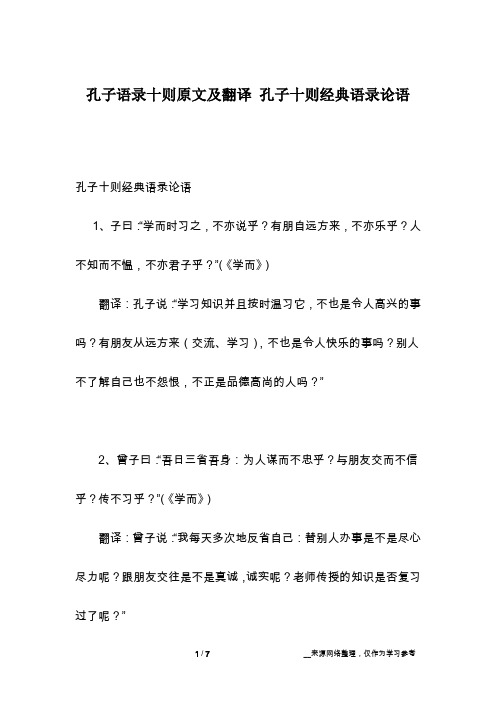
孔子语录十则原文及翻译孔子十则经典语录论语孔子十则经典语录论语1、子曰:“学而时习之,不亦说乎?有朋自远方来,不亦乐乎?人不知而不愠,不亦君子乎?”(《学而》)翻译:孔子说:“学习知识并且按时温习它,不也是令人高兴的事吗?有朋友从远方来(交流、学习),不也是令人快乐的事吗?别人不了解自己也不怨恨,不正是品德高尚的人吗?”2、曾子曰:“吾日三省吾身:为人谋而不忠乎?与朋友交而不信乎?传不习乎?”(《学而》)翻译:曾子说:“我每天多次地反省自己:替别人办事是不是尽心尽力呢?跟朋友交往是不是真诚,诚实呢?老师传授的知识是否复习过了呢?”3、子曰:“温故而知新,可以为师矣。
”(《为政》)翻译:曾子说:“我每天反复检查我的行为:为人处事有不真诚的事吗?与朋友交往有不诚实的事吗?老师教授的知识有不复习的吗?”孔子说:“复习旧的知识从而知道新的知识,可以凭借这个成为老师了。
”4、子曰:“学而不思则罔,思而不学则殆。
”(《为政》)翻译:孔子说:“只读书却不认真思考,就会迷惑;只空想而不读书,就会疑惑。
”5、子曰:“由,诲汝知之乎!知之为知之,不知为不知,是知也。
”(《为政》)翻译:孔子说:“仲由,教给你的理解了吗?懂得就是懂得,不懂就是不懂,这也是聪明啊。
”6、子曰:“见贤思齐焉,见不贤而内自省也。
”(《里仁》)翻译:孔子说:“见到贤人就要向他学习,希望能达到他的水平,见到不好的人就要自我反省。
”7、子曰:“三人行,必有我师焉。
择其善者而从之,其不善者而改之。
”(《述而》)翻译:孔子说:“三个人一起走,其中必定有可以做我老师的人,学习他的优点,如果自己也有他的缺点就加以改正。
”8、曾子曰:“士不可以不弘毅,任重而道远。
仁以为己任,不亦重乎?死而后已,不亦远乎?”(《泰伯》)翻译:曾子说:“有抱负的人不可以不胸怀宽广,意志坚定,因为他肩负着重大的使命(或责任),路途又很遥远。
把实现‘仁’的理想看作自己的使命,不也很重大吗?直到死才停止,这不也是很遥远吗?”9、子曰:“岁寒,然后知松柏之后凋也。
论语中英文对照英译
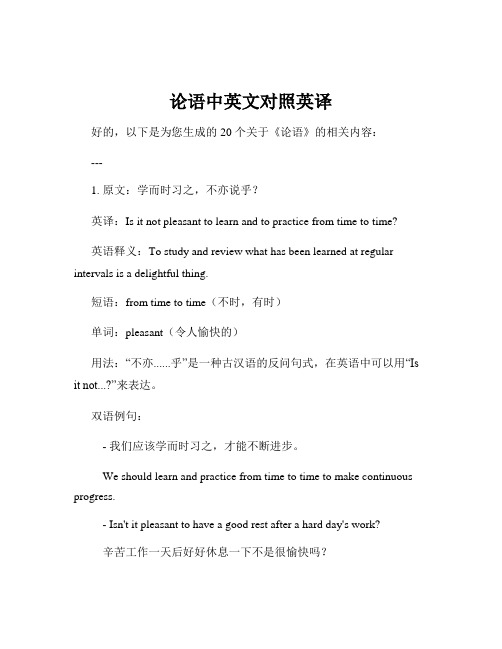
论语中英文对照英译好的,以下是为您生成的 20 个关于《论语》的相关内容:---1. 原文:学而时习之,不亦说乎?英译:Is it not pleasant to learn and to practice from time to time?英语释义:To study and review what has been learned at regular intervals is a delightful thing.短语:from time to time(不时,有时)单词:pleasant(令人愉快的)用法:“不亦......乎”是一种古汉语的反问句式,在英语中可以用“Is it not...?”来表达。
双语例句:- 我们应该学而时习之,才能不断进步。
We should learn and practice from time to time to make continuous progress.- Isn't it pleasant to have a good rest after a hard day's work?辛苦工作一天后好好休息一下不是很愉快吗?2. 原文:有朋自远方来,不亦乐乎?英译:Isn't it a delight when friends come from afar?英语释义:It is a great joy when friends come from a distance.短语:come from afar(来自远方)单词:delight(快乐,高兴)用法:“不亦乐乎”在英语中常用“Isn't it a delight...?”或“Isn't it a pleasure...?”来表达。
双语例句:- 今天有朋自远方来,我非常高兴。
Today, friends come from afar and I'm very happy.- The children were in a state of delight when they saw the presents.孩子们看到礼物时高兴极了。
孔子《论语》全文及翻译

1、子曰:“学而时习之,不亦说乎?有朋自远方来,不亦乐乎?人不知而不愠,不亦君子乎?”译文孔子说:“学了又时常温习和练习,不是很愉快吗?有志同道合的人从远方来,不是很令人高兴的吗?人家不了解我,我也不怨恨、恼怒,不也是一个有德的君子吗?”2、子曰:“巧言令色,鲜矣仁。
”译文孔子说:“花言巧语、满脸堆笑的,这种人是很少有仁德的。
”3、曾子曰:“吾日三省吾身,为人谋而不忠乎?与朋友交而不信乎?传不习乎?”译文曾子说:“我每天都要多次反省自己:为别人出主意做事,是否忠实?交友是否守信?老师传授的知识,是否复习了呢?”4、子曰:“君子食无求饱,居无求安,敏于事而慎于言,就有道而正焉,可谓好学也已。
”译文孔子说:“君子吃不追求饱足,住不追求安逸,做事灵敏,言谈谨慎,时时改正自己的错误,就算好学了。
”5、子曰:“不患人之不己知,患不知人也。
”译文孔子说:“不怕没人了解自己,就怕自己不了解别人。
”6、子曰:“《诗》三百,一言以蔽之,曰:‘思无邪。
’”译文孔子说:“《诗经》三百(零五)首,用一句话可以概括,即:‘思想纯正,没有邪恶的东西。
’”7、子曰:“吾十有五而志于学,三十而立,四十而不惑,五十而知天命,六十而耳顺,七十而从心所欲,不逾矩。
”译文孔子说:“我十五岁,有志于学问;三十岁,(懂礼仪,)说话做事都有把握;四十岁,(掌握了各种知识,)不致迷惑;五十岁,得知天命;六十岁,一听别人言语,便可以分别真假,判明是非;到了七十岁,便随心所欲,任何念头都不会越出规矩。
”8、子曰:“温故而知新,可以为师矣。
”译文孔子说:“复习旧知识时,又能领悟到新的东西,就可以凭着做老师了。
”9、子曰:“君子周而不比,小人比而不周。
”译文孔子说:“君子团结群众而不互相勾结,小人互相勾结而不团结群众。
”10、子曰:“学而不思则罔,思而不学则殆。
”译文孔子说:“读书不深入思考,越学越糊涂;思考不读书,就无所的。
”11、子曰:“由,诲女知之乎! 知之为知之,不知为不知,是知也。
《论语》中英文对照版

《论语》中英文对照版敏而好学,不耻下问。
He was of an active nature and yet fond of learning, and he was not ashamed to ask and learn of his inferiors.十室之邑,必有忠信,如丘者焉,不如丘之好学也。
In a hamlet of ten families, there may be found one honourable and sincere as I am, but not so fond of learning.知之者,不如好之者,好之者,不如乐之者。
They who know the truth are not equal to those who love it, and they who love it are not equal to those who delight in it.学如不及,犹恐失之。
Learn as if you could not reach your object, and were always fearing also lest you should lose it.『⒈3』子曰:“巧言令色,鲜矣仁!”The Master said, "Fine words and an insinuating appearance are seldom associated with true virtue."『⒈6』子曰:“弟子,入则孝,出则弟,谨而信,凡爱众,而亲仁。
行有余力,则以学文。
”The Master said, "A youth, when at home, should be filial, and, abroad, respectful to his elders. He should be earnest and truthful. He should overflow in love to all, and cultivate the friendship of the good. When he has time and opportunity, after the performance of these things, he should employ them in polite studies."『⒈7』子夏曰:“贤贤易色;事父母,能竭其力;事君,能致其身;于朋友交,言而有信。
孔子语录(论语)中英文对照翻译
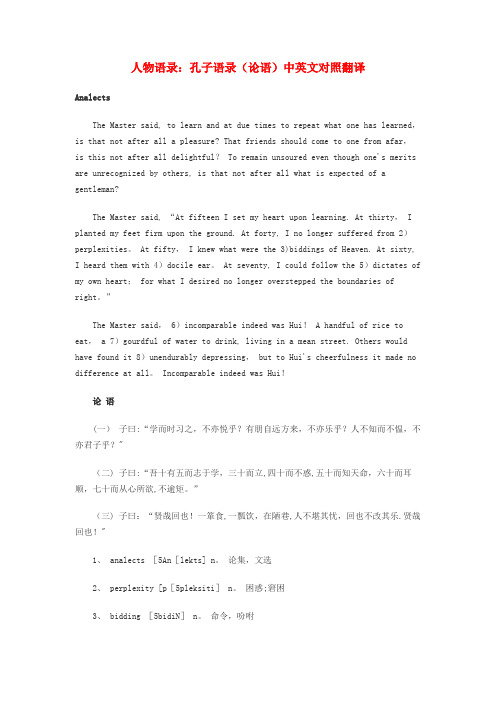
人物语录:孔子语录(论语)中英文对照翻译AnalectsThe Master said, to learn and at due times to repeat what one has learned,is that not after all a pleasure? That friends should come to one from afar,is this not after all delightful? To remain unsoured even though one's merits are unrecognized by others, is that not after all what is expected of a gentleman?The Master said, “At fifteen I set my heart upon learning. At thirty, I planted my feet firm upon the ground. At forty, I no longer suffered from 2)perplexities。
At fifty, I knew what were the 3)biddings of Heaven. At sixty, I heard them with 4)docile ear。
At seventy, I could follow the 5)dictates of my own heart; for what I desired no longer overstepped the boundaries of right。
”The Master said, 6)incomparable indeed was Hui! A handful of rice to eat, a 7)gourdful of water to drink, living in a mean street. Others would have found it 8)unendurably depressing, but to Hui's cheerfulness it made no difference at all。
初中语文-论语十则-中英文双语对照

初中语文-论语十则-中英文双语对照1.1 子曰:“學而時習之,不亦説乎?有朋自遠方來,不亦樂乎?人不知,而不愠,不亦君子乎?”【譯文】孔子説:“學了,然後按一定的時間去實習它,不也高興嗎?有志同道合的人從遠處來,不也快樂嗎?人家不了解我,我却不怨恨,不也是君子嗎?”1.1 Confucius remarked, "It is indeed a pleasure to acquire knowledge and, as you go on acquiring, to put into practice what you have acquired. A greater pleasure still it is when friends of congenial minds come from afar to seek you because of your attainments. But he is truly a wise and good man who feels no discomposure even when he is not noticed of men. "曰:“其爲人也孝弟,而好犯上者,1.2 有子有子——孔子學生,姓有,名若,比孔子小十三歲鮮矣;不好犯上,而好作亂者,未之有也。
君子務本,本立而道生。
孝弟也者,其爲仁之本與!”【譯文】有子説:“他的爲人,孝順爹娘,敬愛兄長,却喜歡觸犯上級,這種人是很少的;不喜歡觸犯上級,却喜歡造反,這種人從來没有過。
君子專心致力於基礎工作,基礎樹立了,‘道’就會產生。
孝順爹娘,敬愛兄長,這就是‘仁’的基礎吧!”1.2. A disciple of Confucius remarked, “A man who is a good son and a good citizen will seldom be found to be a man disposed to quarrel with those in authority over him; and men who are not disposed to quarrel with those in authority will never be found to disturb the peace and order of the State."A wise man devotes his attention to what is essential in thefoundation of life. When the foundation is laid, wisdom will come. Now, to be a good son and a good citizen--do not these form the foundation of a moral life?"1.3 子曰:“巧言令色,鮮矣仁!”【譯文】孔子説:“花言巧語,僞善的面貌,這種人,‘仁德’是不會多的。
- 1、下载文档前请自行甄别文档内容的完整性,平台不提供额外的编辑、内容补充、找答案等附加服务。
- 2、"仅部分预览"的文档,不可在线预览部分如存在完整性等问题,可反馈申请退款(可完整预览的文档不适用该条件!)。
- 3、如文档侵犯您的权益,请联系客服反馈,我们会尽快为您处理(人工客服工作时间:9:00-18:30)。
孔子语录《论语》中英文对照
最近电影《孔子》正在热映中,孔子的《论语》我们在学校里已经学过很多,这里我们来一起了解下,《论语》中的句子翻译成英语都是什么样吧。
本文的句子主要是求知求学类的。
有教无类。
In teaching there should be no distinction of classes.
当仁,不让于师。
When it comes to benevolence, one need not give precedence even to his teacher.
学而时习之,不亦说乎?
Is it not pleasant to learn with a constant perseveranceand application?
温故而知新,可以为师矣。
If a man keeps cherishing his old knowledge, so as continually to be acquiring new, he may be a teacher of others.
学而不思则罔,思而不学则殆。
Learning without thought is labourlost; thought without learning is perilous.
敏而好学,不耻下问。
He was of an active nature and yet fond of learning, and he was not ashamed to ask and learn of his inferiors.
十室之邑,必有忠信,如丘者焉,不如丘之好学也。
In a hamlet of ten families, there may be found one honourable and sincere as I am, but not so fond of learning.
知之者,不如好之者,好之者,不如乐之者。
They who know the truth are not equal to those who love it, and they who love it are not equal to those who delight in it.
默而识之,学而不厌,诲人不倦,何有于我哉。
The silent treasuring up of knowledge; learning without satiety; and instructing others without being wearied -- which one of these things belongs to me?
我非生而知之者,好古,敏以求之者也。
I am not one who was born in the possession of knowledge; I am one who is fond of antiquity, and earnest in seeking it there.
三人行,必有我师焉。
择其善者而从之,其不善者而改之。
When I walk along with two others, they may serve me as my teachers. I will select their good qualities and follow them, their bad qualities and avoid them.
学如不及,犹恐失之。
Learn as if you could not reach your object, and were always fearing also lest you should lose it.。
